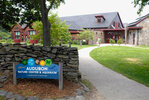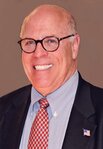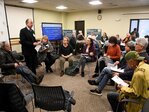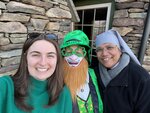More Than Thanks, George
Not always did I realize what a “calling” was. But, I had been through enough, in my early learning and in my personal life, to know that good teaching, the passing on of knowledge, was nice work if you could get it.
An early mentor and role model in that endeavor was George Donovan, the AV director at EP. His was an enormous job, at least when looked upon from the perspective George took.
Our school boasted an enormous auditorium, a grand, fluted-ceilinged affair that put most of us in awe, at least for our first few weeks with it.
This was George’s domain. He ran the shows, from the big time musicals to the little cerebral dramas that the weird ones seemed to like. He was usually in the building, teaching, running projectors, co-ordinating with Police and Fire, calming down smart alecks, and mixing with friends, among whom he could count just about everybody. He worked from about 6:30 to 5:00. More on special occasions.
But, back to the shows. When I arrived at EP as a student, in the fall of 1964, we were still under the leadership of principal James E. Bates, an older gentleman of clear visual distinction. If Harry Potter had had a grandpa, this guy would have been he.
At any rate, a school routine that Mr. Bates insisted upon was called an assembly.
On a weekly basis, eleven hundred of us, or so, would gather under the roof of our grand hall and take in a show. Mr. Donovan was in general charge of those, presiding over the setting up and putting away of tens of thousands of pieces of equipment, large and small, to include stage sets, trailered boats, band equipment. And, in the process, chatting up preachers, tap dancers, comedians, inspirations, and the like.
In addition to being Mr. Donovan’s clear base of operations, the Control Room, a glassed-in area that overlooked our hall, was the premier meeting place for geeks and oddballs of all kinds, one of whom was me, both as a kid and as a fledgling teacher.
When I was fifteen and in tenth grade, George had looked different to me, of course. He was a distant nice-guy, a man put upon from all angles, but generally still very nice. My friend Albert and I couldn’t get over the last name—Donovan. Just like the young British folkie. Mellow Yellow? Atlantis? Get it? George Donovan / Donovan? Was he in a baand?
Guess you had to be there.
If you knew how to thread a projector and run it, you became everyone’s friend, or, at least that was true in the early going. One met musicians, magicians, actors, techies, Edgar Allen Poe impersonators, the whole bit— as the strange mixed freely with the super normal. Stages do that to people. So do movies.
The years of my personal teacherly twenties and thirties went by as my friendship with Mr. Donovan deepened. By then, I’d learned that he and his brother, Navy men both, had been stationed as communications techs just about as far out into the Pacific as any Townie could get from a place called Watchemoket. They were in their late teens at the time. Harry Truman was president.
In my teaching days, during blizzards and other situations of that sort, Mr. Donovan, ever the vet, in conjunction with the Army Reserves or the National Guard, would direct helicopters as they landed in our school’s parking lot. That's just what Mr. Donovan did, displaying a degree of social awareness and efficiency that we all took for granted. He’d achieved similar goals for as far back as most of us, kid or teacher, could remember. It’s what he was like.
The arrival of cable television brought new challenges to our school, and Mr. Donovan became to go-to man for those as well. One day, I mentioned to him that I’d like to make a video about old-time EP grads with a knack for storytelling. George said yes, and through him, I met Rowena Bowen and Warren Ivers.
Rowena’s long life had been lived almost entirely in Riverside, where she had been a beloved teacher herself. She was also the very pretty daughter of a prosperous fellow, who, in the early twentieth century, had owned an icehouse, stocked with natural ice, harvested in winter from a pond which had been scooped out of nearby muck. Turned out that Rowena’s father and a few teams of draft horses had created Willet Pond out of marshland, with diligent work.
Not the Ice Age. Rowena’s Dad.
Miss Bowen spoke precise English, different in kind and quality from my own. She didn’t chide me with that, though. No deficiency slips.
Well into her late eighties, she settled right into tv production, telling George and me about a Riverside long vanished, yet, a land she had seen with her own eyes. Crescent Park when it was an East Coast resort. Stylish people in their boats at the wharves. McCusker’s as a new idea.
It turned out that Warren Ivers, as a boy, had worked for Rowena’s dad. The story of Warren’s that I remember was the one where he got run over by a wagon on Pawtucket Avenue. Near the old Benny’s.
Since that road had not yet been paved, his young frame had just been crushed, harmlessly, into the mud.
Warren was in elementary school when the Armistice ending World War One was officially declared, a century and a month ago as I write this. He was in fourth grade at the time, and his teacher took the class to the fire station near the railroad depot, where each child was allowed to ring the bell. What a relief. The worst war in the history of mankind, ended.
Warren Ivers’ armistice bell still rings as a memory all these years later. And, today, I am comforted by a recognition deeper than the one I left with when I retired from teaching.
Many of the people with whom I taught were both unusual and unusually kind. George Donovan was, and remains, prominent among those beloved ones.
It’s more than, “Thanks, George.” I know that.
Arnie McConnell
Seekonk

















Comments
No comments on this item Please log in to comment by clicking here